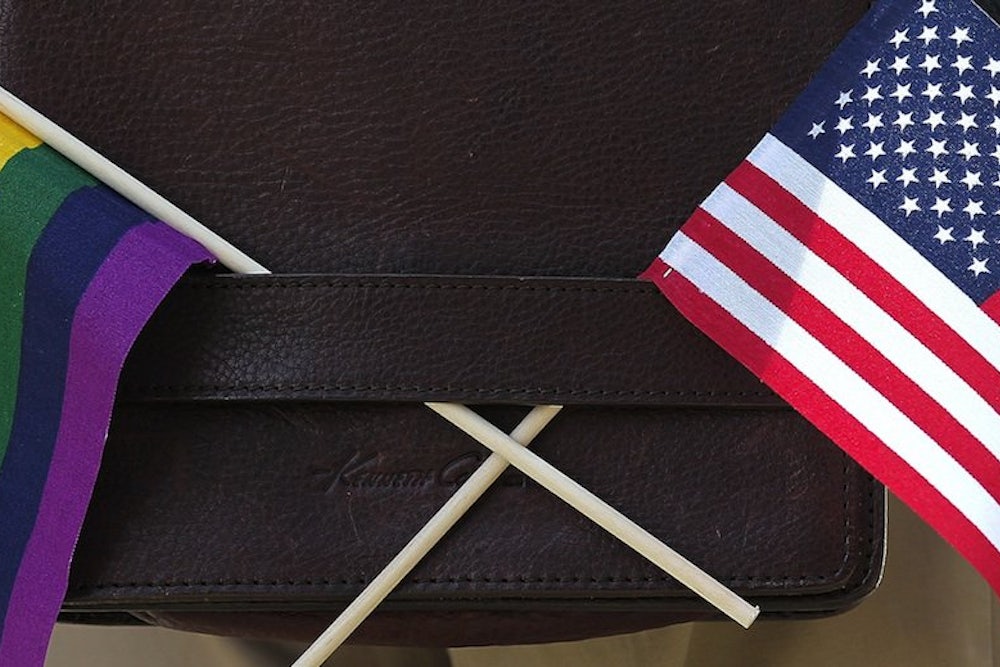As the Supreme Court contemplates two gay marriage cases this week, supporters of the cause are feeling optimistic. Even if the Court does not establish a Constitutional right to gay marriage, many feel they will continue to gain ground in the court of public opinion. On Tuesday, Nate Silver published a model forecasting that gay marriage will command majority support in 44 of the 50 states by 2020, with opposition only holding out in the South. Given the increase in public support for gay marriage over the last few decades, it’s hard to dismiss the possibility. But looking closely at the trendlines of conservative voters, the South could hold out much longer than Silver predicts. Without a sweeping court decision, it could be some time still before gay marriage is legal everywhere in the United States.
Silver’s model assumes that support for same-sex marriage will increase linearly and uniformly. But, although support for gay marriage has been increasing steadily for nearly two decades, the increase in support has not been uniform across demographic groups. While white Protestants, moderates, and Democrats have rapidly grown more supportive of gay marriage, other groups, like conservative Republicans and evangelicals, have moved more slowly. According to Pew Research, just 19 percent of white evangelicals support gay marriage, only a 7-point increase from 12 percent a decade ago. Similarly, just 18 percent of conservative Republicans support gay marriage—an even smaller, 3-point increase. Meanwhile, overall support for gay marriage is 15 points higher than it was in 2004.
Generational change isn’t changing evangelical support as it is with other demographic groups, either. According to Pew Research, just 25 percent of 18-34 year old white evangelicals support gay marriage. That’s 6 points higher than evangelicals overall, but far smaller than the 18-point gap between all millennials and all adults.
Recent southern referendums on gay marriage confirm that evangelicals aren't moving as fast as the rest of the country. North Carolina’s 2012 successful same-sex marriage initiative was perhaps the most geographically polarized election contest in recent memory. Eighty percent of voters in sixteen rural, white, deeply conservative counties supported the ban—including one county where opposition to gay marriage reached 89 percent. That’s almost exactly how gay marriage performed in rural, conservative, white stretches of the Florida Panhandle in 2008, Tennessee in 2006, and Texas in 2005. By contrast, support for gay marriage matched Obama's performance in North Carolina's Research Triangle, just four years after gay marriage ran far behind Obama in Silicon Valley.
Unless rural, white evangelical support increase their support for gay marriage, gay marriage will struggle in states like North Carolina, let alone more conservative states like Tennessee. Forty percent of North Carolinians are white evangelicals. Even if evangelical support for gay marriage surges to 30 percent in North Carolina, gay marriage would need 63 percent of the non-evangelical vote to take a statewide majority. That would be tough, considering North Carolina also has a large black evangelical population that is skeptical of gay marriage. And North Carolina is probably the best gay-marriage battleground in the South, other than Virginia: It has large, well-educated, and socially liberal metropolitan areas, unlike the Great Plains or most other Southern states.
With evangelicals slower to change their minds, Southern states should move at a slower pace than the national average. To date, support for gay marriage has increased at a roughly linear rate of 2 points per year. But it’s possible that increases in support could slow in the medium-term, as non-evangelical groups hit the point of diminishing returns. If evangelicals don’t pick up the slack by shifting faster on gay marriage, support for gay marriage could plateau. Parts of the South, Plains, and West would probably still have gay marriage bans, and the Supreme Court, despite its hopes to avoid a judgment, might be forced to make the final call.
